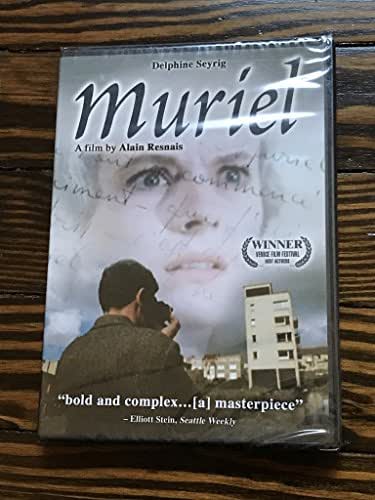Muriel, or the Time of Return
Muriel ou le temps d'un retour
***½/**** Image B Sound B Extras A
starring Delphine Seyrig, Jean-Pierre Kérien, Nita Klein, Jean-Baptiste Thierrée
screenplay by Jean Cayrol
directed by Alain Resnais
by Travis Mackenzie Hoover Alain Resnais films are more interesting to me for their differences than for their similarities. Though you can find an oft-cited obsession with memory running through his oeuvre, the high-profile literary screenwriters with whom he chooses to collaborate tend to impose their own sensibilities. Thus Hiroshima, mon amour features Marguerite Duras' passive-aggressive desperation and Last Year at Marienbad is marked by Alain Robbe-Grillet's mathematical abstractions. Neither of those two canonical works–which are at least united by a conceptual monumentalism–looks very much like Muriel, or The Time of Return (Muriel ou le temps d'un retour) (hereafter Muriel, also its promotional title), which enlists Jean Cayrol to sketch a story of domestic dishonesty and historical trauma that's at once spatially smaller and more emotionally expansive. Here, if one isn't confronted with the ostentatious "artistry" of Resnais' more famous work (not that great artistry isn't evident), one is aware of a tangle of guilt and regret behind the brave faces. And whoever can be said to be in the driver's seat, it's an amazing film.
"Muriel" never makes an appearance on screen. She's said to be her stepson's fiancée by middle-aged widow Helene (Delphine Seyrig), but even she's never seen her. At any rate, Helene has bigger fish to fry, as she's expecting a visit from old flame Alphonse (Jean-Pierre Kérien), whom she loved during the war and hasn't seen in too long. He arrives at the Boulogne train station with his "niece" Françoise (Nita Klein) in tow; everyone's civil save said stepson, Bernard (Jean-Baptiste Thierrée), who's rude and erratic throughout the initial dinner. But as the visit progresses, the level of deception and miscommunication among all four intensifies. Helene and Alphonse enact a psychodrama of what happened between them in the dark days of the war, while Françoise turns out to be Alphonse's lover. Bernard, a veteran of the Algerian war, nurses his pain over the horrors in which he participated–including the torture and murder of the titular Muriel.
It's better if you go in unprepared for the major twists of the plot–not because they're shocking events à la The Crying Game, but because they're as much a process of discovery for us as they are for the characters. As the movie progresses, we're confronted with a maze of complexity, of people trying to protect their self-images when they won't conform to reality and operating on half-information that horrifies when it's actually brought to completion. The past is seen as something one seeks to escape but never can: the characters don't master their histories, their histories master them. The apparently-innocent reconnection of old lovers proves to be grounds for blame and recrimination, topped off with the cherry of Bernard's war trauma and his own inability to reconcile old wounds. What happened is always influencing what is, to the point where people cannot continue going forward.
Or rather, they shouldn't continue to go forward. Muriel is extremely poignant in its depiction of individuals carrying on regardless while bearing heavy loads: the Second World War and its disruptions, what-ifs of old lost loves, Algerian atrocities, and general personal failures engender a web of lies and face-savings that is essential for living one's life but which cuts off the possibility of facing the music. Not that that would help: only Bernard is in touch with his anger over the past, and it does him no good, making him a bundle of nerves with no hope for catharsis as he relives the pain and guilt of what he did in Algeria. The pathetic souls of Muriel shuttle between the extremes of denial and horror–of shrinking from the thing that bothers you and being drawn and quartered by it once you finally confront it head-on.
It would be saying a bit much to call this film by a famously "cold" director an about-face into warmth, yet great sympathy is inferred as his characters flail about, aided by a gently ironic editing scheme that is constantly recontextualizing our heroes in relation to each other. Although there is the occasional fumbling of random jump cuts, Muriel is mostly focused on undercutting anyone's attempt to master the narrative–a tragic approach, as mastering one's own narrative is the protagonists' elusive goal. Resnais and Cayrol manipulate perspective in order to establish the swirl of cross-purposes that maul the characters, but without a godlike arrogance about what ought to have been done. One gets the impression that our men would be no better in these situations than the people they've enlisted for the task. For a director of world prominence (and, after Last Year at Marienbad, at the height of his fame and power), that's nothing short of astonishing.
THE DVDKoch Lorber does a respectable job in bringing Muriel to DVD at last. The 16×9-enhanced image, pillarboxed at 1.68:1, is perhaps a tad jaundiced, but this doesn't conflict much with the early-'60s colour scheme; really, scratches and other signs of wear and tear are a bigger problem. Attendant Dolby 2.0 mono audio is predictably flat and one-dimensional. The only major extra is "L'atelier d'Alain Resnais" (13 mins.), an interview with Resnais scholar Francois Thomas, who gives his all in explicating the film's origins (not only in the Algerian war but in the music hall as well), Cayrol's five-act script as it diverges from the mad scramble of Resnais' direction, and the themes explored in both form and content. It's a superior clip, the model of a DVD extra. Muriel's trailer plus trailers for La Belle captive, Un Coeur en hiver, Changing Times, Gilles' Wife, and Children of the Century round things out.
112 minutes; NR; 1.68:1 (16×9-enhanced); French DD 2.0 (Mono); English (optional) subtitles; DVD-9; Region One; Koch Lober





